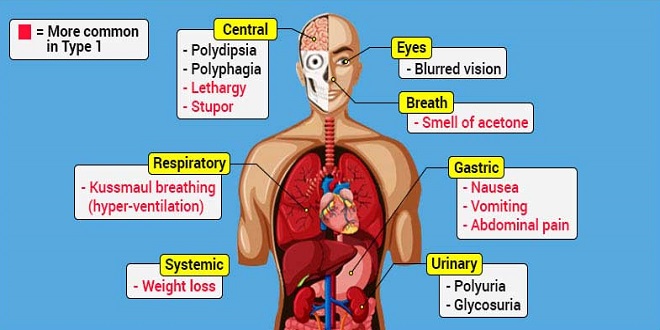
Diabetes is an autoimmune condition that causes blood sugar (sugar) levels to drop. Diabetes mellitus is often used to refer to symptoms of diabetes.
It is a condition that affects the body’s ability to produce insulin and use it. If left untreated, diabetes can lead to damage to the eyes and nerves as well as kidneys and other organs. These are the signs to watch out for.
What are the signs and symptoms of Diabetes?
Symptoms are often not apparent. These common symptoms may be present if they do occur.
Frequent urination
Thirsty
Unexplained weight loss
Increased hunger
Brilliance in vision
Tingling or numbness in the feet or hands
Fatigue
Dry skin
Slowly healing sores
More infections than usual: Gums, skin and vaginal
Frequent urination
Insulin creation is a problem for people with diabetes.
Insulin is a hormone that the pancreas secretes to convert sugar into energy.
Too much sugar in the blood can cause damage to the kidneys.
The kidney damage leads to the expulsion of glucose and other hydrating fluids via urine.
This process also dehydrates patients’ bodies.
Feeling thirsty
High blood sugar levels can cause frequent urination.
High blood sugar levels can lead to dehydration due to the overwork of the kidneys.
Unexplained Weight Loss
Diabetes sufferers who have low insulin levels and are unable to absorb sugar from their blood can experience rapid weight loss. Learn more about weight loss and diabetes.
Increased hunger
Diabetes patients are more hungry due to their high blood sugar levels.
Blurry Vision
Blurred vision can be caused by many factors, including high sugar levels or excessive spikes.
Blurred vision is a sign of diabetes.
If this condition is left untreated, it can lead to diabetes retinopathy, cataracts and glaucoma.
Tingling or numbness in the feet or hands
An excess of blood sugar can lead to tingling or loss sensations in the hands and feet.
Fatigue
Diabetes patients can experience fatigue from high and low glucose levels.
People with diabetes may also feel fatigued by depression, insomnia, side effects of medication, depression, anxiety, medication side effects, sedentary lifestyles, insufficient nutrition and not eating at the right times.
Dry skin
Diabetes patients may experience frequent urination, which can lead to excessive fluid loss.
Dry skin can eventually lead to many other problems.
Slow healing
Diabetes can affect the body’s ability produce and use insulin, which results in slow wound healing.
Diabetes patients are more likely to develop small wounds into ulcers.
The most common injury to the foot is a wound that can lead to amputation.
Diabetes patients should take good care of their wounds to reduce the chance of complications.
Poor blood circulation, neuropathy and immune system deficiencies, as well as infections can all cause slow healing in diabetic patients.
More infected than usual
High blood sugar and insulin resistance can affect the immune system.
Patients with diabetes experience a decline in their immune system.
Inflammation can lead to a decrease in body’s ability to fight off bacteria, which eventually leads to more infections.
High blood sugar levels can also transmit bacteria through the bloodstreams.
Untreated infections can lead to sepsis or gangrene.
How to visit a doctor?
Glucose, an essential energy source for the body’s vital functions, is required. It provides energy for muscles and tissues. Too much sugar can lead to serious health problems due to many factors, such as lifestyle changes and imbalances.
Most cases of diabetes are different from one person to the next. If you have any of these symptoms, it is important to seek medical attention.
Patients with gestational and prediabetes need to be closely monitored by their doctor. Prediabetes refers to a condition where blood sugar levels are higher than normal but not too high to be diagnosed as diabetes. This type of diabetes can be reversed.
Lastly
Diabetes symptoms that get worse with time or progress to the root cause may result in more serious complications.
Long-term health and healing is best promoted by eating a balanced diet, exercising, quitting smoking, and ensuring good nutrition. To avoid further complications from diabetes, schedule a consultation with the Greeneville dentist to discuss gum surgery.
You should consult a doctor if you have any questions or experience any signs of diabetes, such as tingling, burning sensations in the hands, feet, swelling, persistent pain, poor wound healing and weak immunity, blurry vision, high blood glucose levels, neuropathy, nephropathy, or obesity. Consult your doctor.




